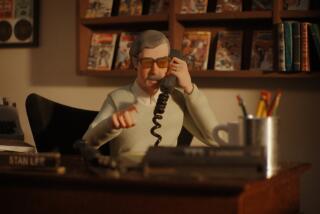BOOK REVIEW : The Unlikely Heroics of Unstrung Uncles : UNSTRUNG HEROES My Improbable Life With Four Impossible Uncles<i> by Franz Lidz</i> Random House$18.95, 189 pages
- Share via
“Unstrung Heroes” starts off as a kind of cracked urban fairy tale: “There once were five crazy brothers who grew up on the Lower East Side,” writes Franz Lidz. “Four turned into my uncles. One became my father.”
Almost immediately, however, the book turns into a miniature “Brothers Karamazov,” a real-life tragedy masquerading as a screwball comedy.
“My uncles were smelly, screwy, astonishingly scrawny old guys who had abandoned everyday life,” Lidz writes, nicely summing up the improbable heroes of his own book.
“The world had packed them away in a back closet, like old sweaters. They still managed to pop up at the most inappropriate moments, subverting my mother’s insistence on good manners and personal hygiene, and making a joke out of my father’s cold, scientific detachment. As a boy, I happily enlisted in their conspiracy against sanity. Now, as I write about these flickering men, I realize they kept me reasonably sane.”
Lidz, a writer for Sports Illustrated, tries valiantly to adopt the approved tone of voice for comical family memoirs: bantering, clever, ironic, a kind of Woody Allenesque reverie on the lovable grotesques of his family. But Lidz cannot suppress the overwhelming tenderness that he feels toward these four men, and he confesses openly that he is moved to write about them “before they outlive what they mean to me.”
Uncle Danny was an old Bolshevik with a persecution complex who would break into the “Internationale” at baseball games: “This is the country that persecuted Thomas Paine, the Rosenbergs and Jonas Salk,” he’d say. “Why not me?”
Uncle Arthur was a pack rat who collected everything from old newspapers to trusses, but he loved shoelaces most of all: “I see new laces every day,” says Uncle Arthur. “Millions of laces, millions of shoes. Still got feet in them, but they’ll wear out. I’ll get the laces. I got time.”
Uncle Leo was “a Joycean of Ulyssean fussiness and a mental patient of Poundian duration,” Lidz writes. “I think of him now as a kind of shaman, an ecstatic medicine man in touch with some other world.”
And Uncle Harry was a gentle psychotic who dispatched birthday gifts to Lidz from his quarters at the Gowanda State Hospital in Upstate New York--an all-day sucker and a pack of Parliaments arrived when he was still in high school. “Cancan dancers are always hungry,” was the message on one of his maniacal missives.
Lidz is less enchanted with his own father: “I was pretty sure my father loved me, but I was never completely sure he loved me any more than he did a problem in theoretical physics.” But he concedes that “what is endearing in an uncle can be deplorable in a father.” Still, even Lidz’s father is a zany figure, “a benign Mephistopheles” who would leave the dinner table and descend into the basement “to build a nuclear reactor out of a Bunsen burner.”
“Unstrung Heroes” is billed by its publishers as a “comic tour de force,” but there is tragedy at the heart of Lidz’s memoir, starting with the lingering illness and early death of his mother.
As a young child, Lidz recalls, he named the make-believe players in an imaginary ballgame using words that he heard around the house: “I calculated their lifetime stats and knew what each of them looked like,” Lidz writes. “Metastasis was tall, Carcinoma quick, Sarcoma powerful and deadly.”
Against the horror of his mother’s illness and death, the estrangement brought on by his father’s remarriage and the suicide of his best friend, the craziness of his four uncles was a safe haven. On the very day of his mother’s funeral, Lidz retreats to the den to watch cartoons with his uncles. “The dark room and Uncle Danny’s cigarette and Uncle Arthur’s old paper smell,” he writes, “made me feel safe.”
It’s always treacherous for a writer to parade his own cherished memories of childhood for others to see--one false move, and the whole effort collapses into bathos. But “Unstrung Heroes” is a funny and charming book, and impresses most of all because of its sturdy grip on a childhood that was not always funny or charming. There’s not a false moment in the book, and that is high praise indeed.
Next: Richard Eder reviews “The Viper Tree” by Joseph Monninger (Simon & Schuster).
More to Read
Sign up for our Book Club newsletter
Get the latest news, events and more from the Los Angeles Times Book Club, and help us get L.A. reading and talking.
You may occasionally receive promotional content from the Los Angeles Times.










